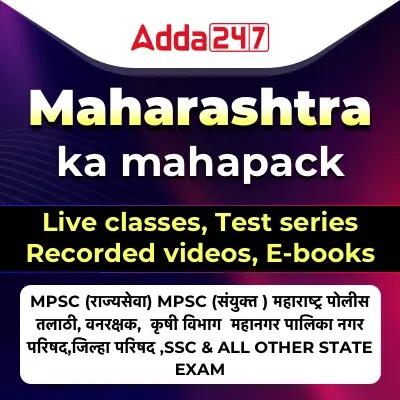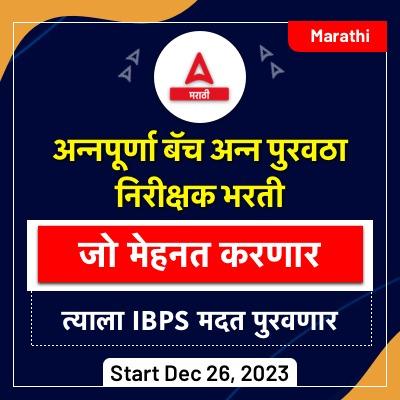Table of Contents
Adverbs
Adverbs: महाराष्ट्रातील तसेच राज्यातील बहुतेक स्पर्धा परीक्षेचा महत्वाचा विषय म्हणजे इंग्लिश. इंग्लिश विषयात जास्त करून इंग्लिश ग्रामर वर प्रश्न विचारले जातात. नेहमीच्या सरावाने इंग्लिश विषयात चांगले गुण मिळू शकतात. आगामी काळातील भरती जसे की, आदिवासी विकास विभाग भरती आणि इतर स्पर्धा परीक्षांमध्ये इंग्लिश ग्रामरला विशेष महत्त्व आहे. इंग्लिश ग्रामर चे रोज वाचन फायदेशीर ठरते. इंग्लिश ग्रामर मधील एक महत्वपूर्ण घटक म्हणजे Adverbs. यावर परीक्षेत हमखास 1 ते 2 प्रश्न विचारले जाऊ शकतात. या लेखात आपण Adverbs याची माहिती पाहणार आहोत.
Adverbs: विहंगावलोकन
इंग्रजी व्याकरणाचा अभ्यास करतांना Adverbs या घटकाचा अभ्यास करणे महत्वाचे ठरते. या लेखात Adverbs बद्दल सविस्तर माहिती दिली आहे.
| Adverbs: विहंगावलोकन | |
| श्रेणी | अभ्यास साहित्य |
| उपयोगिता | आदिवासी विकास विभाग आणि इतर सर्व स्पर्धा परीक्षांसाठी उपयुक्त |
| विषय | इंग्रजी व्याकरण |
| लेखाचे नाव | Adverbs |
| लेखातील प्रमुख मुद्दे |
|
Adverbs
Adverbs are words that add more information to verbs, adjectives, or other adverbs. They answer the questions how, when, where, why, or to what extent. Here are some examples of adverbs modifying different parts of speech:
- Verbs: The dog barked furiously. (how)
- Adjectives: The food was incredibly delicious. (to what extent)
- Other adverbs: She ran much faster than I did. (how much)

Adverbs can be formed in a few different ways:
- By adding “-ly” to an adjective: slow > slowly, happy > happily
- By using a single word: fast, soon, often, well
- By using a phrase: in a hurry, on time, with care
Different types of adverbs:
- Manner adverbs: These adverbs tell you how something is done. Examples: quickly, slowly, carefully, carelessly.
- Degree adverbs: These adverbs tell you to what extent something is true.
Examples: very, quite, extremely, hardly.
- Frequency adverbs: These adverbs tell you how often something happens.
Examples: always, usually, sometimes, never.
- Place adverbs: These adverbs tell you where something happens. Examples: here, there, everywhere, nowhere.
- Time adverbs: These adverbs tell you when something happens. Examples: now, then, soon, later, always.
Adverbs are an important part of speech because they can add more detail and interest to your writing and speaking. They can help you to create vivid descriptions and to express your ideas more clearly.
Some examples of how adverbs can be used in sentences:
- The runner quickly crossed the finish line. (manner adverb)
- The movie was very funny. (degree adverb)
- I usually go to the gym on Tuesdays and Thursdays. (frequency adverb)
- I left my keys at home. (place adverb)
- We will see you tomorrow. (time adverb)
Practice Question-Answers on Adverbs-
Directions: Read each sentence to find out whether there is any grammatical error in it. The error, if any, will be in one part of the sentence. The number of that part is the answer. If there is no error, the answer is ‘4’ i.e. No error. (Ignore the errors of punctuation, if any).
Q1. I am absolute confident (1)/that we are going to move forward, (2)/strongly. (3)/No error (4)
Q2. My brother has done (1)/and is still doing (2)/excellent work for his business. (3)/No error (4)
Q3. Sarika was popularly with her classmates (1)/that she had always some (2)/people coming to her for advice. (3)/No error (4)
Q4. No sooner he had arrived home (1)/than he was asked (2)/to start on another journey. (3)/No error (4)
Q5. Columbus was the first man who invented (1)/ America after his so many (2)/hazardous journeys. (3)/No error (4)
Q6. When I found she was (1)/ there than his father came and started (2)/scolding him very loud. (3)/No error (4)
Q7.When I found she was (1)/too glad to meet me, I was lured to live (2)/ with her for some days. (3)/No error (4)
Q8. I wrote yesterday a letter (1)/ with the view to reminding her of her (2)/selection in our team. (3)/No error (4)
Q9. You will fail (1)/in the examination unless you (2)/ work hardly. (3)/No error (4)
Q10. Even if I had (1)/the money I wouldn’t (2)/buy a car now. (3)/No error (4)
Solutions-
S1. (1); Use ‘absolutely confident’ in place of ‘absolute confident.
S2.(4); No error.
S3.(1); Use ‘popular’ in place of ‘popularly’.
S4.(1); Use ‘No sooner had he’ in place of ‘No sooner he had’.
S5.(1); Use ‘discovered’ in place of ‘invented’.
S6. (3); Use ‘loudly’ in place of ‘loud’. Here ‘loud’ is used to modify “scold (verb)” so adverb ‘loudly’ must be used.
S7. (2); Use ‘very’ in place of ‘too’.
S8.(1); Use ‘I wrote a letter yesterday’ in place of ‘I wrote yesterday a letter’.
S9. (3); Use ‘work hard’ in place of ‘work hardly’.
S10. (4); No error.
Note: महाराष्ट्रातील सर्व स्पर्धा परीक्षांसाठी ऑनलाईन क्लास, व्हिडिओ कोर्स, टेस्ट सिरीज, पुस्तके आणि इतर अभ्यास साहित्य खाली दिलेल्या लिंक वर क्लिक करून मिळवा.
Maharashtra Exam Study Material
अड्डा 247 मराठी अँप | अड्डा 247 मराठी टेलिग्राम ग्रुप








